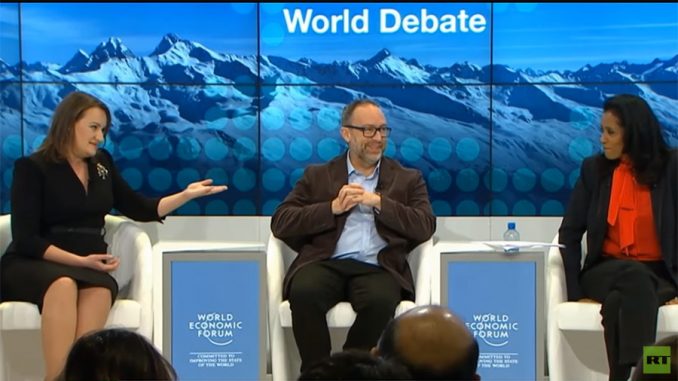
The BBC have forgiven themselves and other mainstream media outlets over their false reports about Iraqi weapons of mass destruction in 2001, insisting the reports were not ‘fake news.’
According to a BBC-hosted panel at the Davos Economic Forum on Wednesday, the same US intelligence agencies that fed mainstream media outlets the lies about Iraqi WMDs should be trusted when they say that outlets such as RT are “Russian propaganda.”
Rt.com reports: RT’s deputy editor-in-chief, Anna Belkina, was on the defensive at the event, arguing that RT deserves the same support of fellow news organizations that the New York Times or CNN enjoy when US President Donald Trump labels them fake news.
RT was targeted in a similar attack by French President Emmanuel Macron, whose administration has yet to present a single example of RT’s alleged false reportage.
“Those accusations are false. They are demonstratively false,” Belkina said. “RT has actually been a target of false information spread about it. [Macron’s] campaign has repeatedly made claims that RT has made false stories about their candidate. However, throughout the duration of the campaign or thereafter they failed to provide a single example of such a news story.
“The term [‘fake news’] is absolutely toxic because it muddles the debate and just the public discourse about accuracy and factuality of information. We also see it weaponized by public figures, but also by media organizations as a way to silence dissenting voices, as a way to avoid answering to any kind of criticism.”
The argument that RT deserves professional courtesy seemed to be dismissed on the grounds that it is “Russian propaganda,” which is an attitude shared by many people in the Western MSM.
“We should distinguish between fake news generated by teenagers… and propaganda, something like RT. Muddling those two together is really a huge mistake,” Jimmy Wales, the co-founder of Wikipedia, argued.
The accusations, it seems, only require spokespeople for serious organizations to voice them in order to be deemed true.
“I know you will say they are all false, but they come from so many quarters,” one panelist said about the accusations. “NATO says it has been dealing with a significant increase of Russian propaganda and disinformation since 2014. Mark Zuckerberg from Facebook has denounced (a) Russian fake news agency. I could really go on and on.”
“The evidence is from so many places,” Wales agreed. “The Columbia journalism school had a team of graduate students set [up] the project RT Watch. And they found multiple examples of misrepresentation, false stories, fake experts, outright lies. It’s overwhelming. That’s not really an open question.”
The project, which is no longer active, seems to be targeting RT’s editorial policy in stories ranging from Russia’s row with Ukraine to a scandal involving a twerking dance in front of a World War II memorial. It was not immediately clear what Wales meant by “outright lies” in RT’s coverage.
Badawi also claimed that RT is “no equivalent” to the BBC, as the latter “is subjected to an independent regulator, Ofcom, which has nothing to do with the government and… regularly makes reports and investigations, which criticize the government.” Belkina responded that the UK branch of RT is also regulated by Ofcom.
I’ve worked with @BBC and @RT_com and the facts are: BBC’s editorial policy is heavily censord. Any content inconsistent with UK govt directives is cut, whereas RT journalists are free to be independent | https://t.co/4mVXxoT3z4
— Max Keiser (@maxkeiser) January 24, 2018
The infallibility of the Western mainstream media was also questioned by Bilawal Zardari, the chairman of the Pakistan Peoples Party, who said that various actors in the public discourse have peddled certain agendas and that the US has done so as well.
“Politicians, media outlets, partisan outlets push out agendas. But let’s not forget that WMDs in Iraq was also fake news,”he said.
This did not sit well with Joseph Kahn, a managing editor of the New York Times, who angrily dismissed the notion that the US MSM fiasco over Saddam Hussein’s non-existent WMDs could be called ‘fake news.’
“I wouldn’t want us to walk away from here with a general sense that the panel accepts that notion of WMDs in Iraq is a good example of fake news. To me that is not a good example of fake news,” he said. “That’s an example of seriously flawed policy for political goal, which was covered aggressively and ultimately inaccurately by the news media.”
“They pitched the US intelligence narratives which were absolute fiction. So I don’t know [how] else you describe [fake news],” Zardari retorted.
“They turned out to be absolute fiction. They were not known to be fiction at the moment that they were being discussed. If they were known to be fiction, we would not have reported them. [the MSM] reexamine their coverage of that, but there was no knowledge that these were fictitious narratives,” Kahn said.
Apparently, being servile to the government rather than scrutinizing its motives and arguments for an invasion is perceived as normal. Interestingly though, when the same intelligence agencies dupe the trusting US media into unwittingly circulating the false narrative that Russia meddled in the 2016 US presidential election, no evidence is necessary.
Source Article from http://yournewswire.com/bbc-iraqi-wmds-not-fake-news/
Related posts:
Views: 0
 RSS Feed
RSS Feed

















 January 26th, 2018
January 26th, 2018  Awake Goy
Awake Goy 
 Posted in
Posted in  Tags:
Tags: 
















